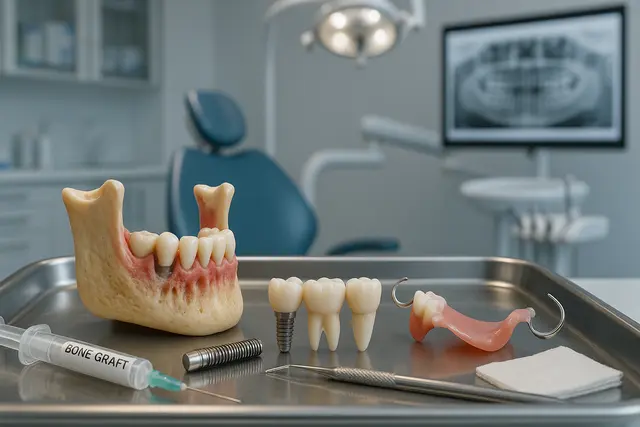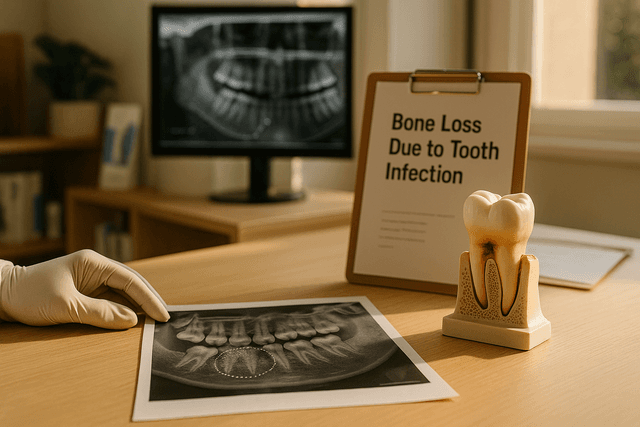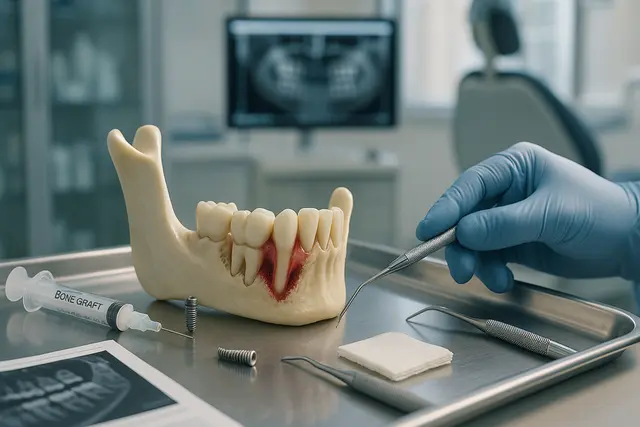Oral Health
5 min read
Jun 30, 2025
How to Sleep With Tooth Pain: 7 Tips for a Better Night’s Rest
Ever tried falling asleep with a throbbing toothache? It's the kind of misery that turns your pillow into a torture device and your bedroom into a battlefield. Whether it’s a cavity, gum irritation, or that one wisdom tooth making its grand entrance at the worst possible time, tooth pain at night can leave you wide awake and desperate for relief. The good news? You don’t have to suffer till sunrise.

There are few things more maddening than finally getting into bed, ready for some peace and quiet… only for tooth pain to show up like an uninvited guest who refuses to leave. It’s not just a little annoying, it's enough to keep you tossing and turning, questioning every life decision that led to this exact moment.
Why is a toothache at night so much worse? It’s like the second you lie down, the pain throws a party in your mouth. Whether it’s a cavity, wisdom teeth coming in hot, or just a plain-old toothache at night, the pressure builds, and suddenly sleep feels impossible. If this is you right now, yep, been there. Here’s how to make it through the night without losing your mind.
1. Toothache? Keep Your Head Elevated (Literally)
Here’s the thing: when you lie flat, blood flows more easily to your head, which can make the pain from a toothache feel like it’s pounding in rhythm with your heartbeat. Cute, right?
One of the easiest tricks? Stack an extra pillow or two to keep your head elevated. It won’t magically erase the pain, but it can lower the pressure enough to take the edge off. Sometimes that’s all you need to fall asleep, or at least drift off before the next wave of ache rolls in.
2. When in Doubt, Call Your Dentist (Seriously)
Nobody likes hearing this, but if your tooth pain has been sticking around for more than a day or two, or if it’s waking you up at night, it’s time to stop waiting and make that dental appointment. A dentist can figure out what’s going on inside the tooth, whether it’s tooth decay, an infected tooth, or something more serious like a cracked root or gum abscess.
Even if you’re just trying to survive the night, knowing that you’ve got a professional dental treatment plan in the works can take a bit of the panic out of your evening. A real plan means real pain relief. Plus, let’s face it, if it hurts this much now, it’s not going to fix itself.
3. Tooth Pain? Over-the-Counter Relief Can Help
If you’ve ever sat in the dark wondering which over-the-counter pain medication works fastest, welcome to the club. The go-to options are ibuprofen and acetaminophen. Ibuprofen is great if there’s swelling, it’ll reduce inflammation while dulling the pain. Acetaminophen is solid if you’re just trying to shut the pain off long enough to get to sleep.
And yes, it’s okay to combine them if your doctor says it’s safe. But if you’re using them regularly just to survive the night, it’s time to schedule a dental exam. Painkillers are great for temporary relief, not a long-term fix.
4. Pain Reliever Not Enough? Try Home Remedies That Actually Work
Sometimes, you just want to try something natural. Maybe you’ve already taken a pain reliever, or maybe you’re saving it for 3 a.m. Either way, there are a few home remedies that aren’t total nonsense.
The classic salt water trick still works. Mix a teaspoon of salt into warm water and rinse your mouth gently. It can ease irritation and help your gum feel a little less angry.
If you have an ice pack handy, wrap it in a towel and press it to your cheek in 15-minute intervals. This can reduce pain and swelling, especially if your face is puffing up like a balloon.
Bonus trick? A peppermint tea bag, cooled to just-warm. Press it gently against your sore spot. It’s not magic, but it can soothe the pressure and pain just enough to make your bed feel less like a battleground.
5. Try a Soothing Rinse or Numbing Gel
There’s something about a cool, minty rinse that can make a bad situation feel just a little more manageable. Look for alcohol-free mouthwashes designed for oral health or try a gentle homemade salt water rinse. It helps clean the area and can wash away debris irritating your gum.
Another option? Over-the-counter gels like benzocaine. These topical numbing agents can help relieve pain fast, just don’t go overboard, and make sure you’re using the adult version if you’re not a kid.
Do these give lasting results? Not really. But they can take the sting out just long enough for you to sleep peacefully. Sometimes, that’s the win you need.
6. Cold Compress for the Win
Let’s say your cheek is puffy or there’s a dull throb you just can’t shake. A cold compress can help tone down that nighttime pain. It’s not high-tech, but it works.
Place an ice pack (wrapped in something soft) on the outside of your jaw for 15 minutes. It’s especially helpful if the pain is coming from a recent dental procedure, trauma, or a brewing gum infection. Just don’t put ice directly on the skin unless you like frostbite with your toothache.
If you can distract your nerves with cold, you’ll find it a little easier to get rid of a toothache, or at least convince your brain to ignore it for long enough to snooze.
7. If You Can’t Sleep, Don’t Tough It Out, Seek Emergency Dental Care
Here’s the deal: if you’ve tried pain medication, home remedies, rinses, elevation, cold packs, and you still can’t sleep, that’s your sign. This isn’t a regular toothache. This is probably a full-blown dental emergency.
Unbearable tooth pain, swelling in your jaw or face, fever, or pain that’s spreading? Time to stop Googling and call for emergency dental help. Some clinics offer after-hours or next-day appointments for exactly this kind of situation. Delaying it can mean more damage, a higher bill, and longer recovery. Don't wait until you're curled up on the bathroom floor whispering apologies to your tooth.
Final Thoughts
Sleeping with tooth pain isn’t just uncomfortable, it’s exhausting. It affects your mood, your focus, and your whole day. Whether it’s a cavity, broken tooth, or a stubborn wisdom tooth, treating a toothache the right way means balancing short-term pain relief with long-term dental care.
Yes, you can power through the night with a combination of smart tricks, over-the-counter help, and the occasional prayer to the Tooth Fairy. But if the pain keeps coming back, your best move is to book a visit for professional dental care and finally fix what’s been keeping you up.
Take care of your teeth. They’ve got roots, feelings (sort of), and apparently, a flair for pain at night. Give them the care they need, and you might just get your night’s sleep back, too.
Why Does Tooth Pain Feel Worse at Night?
Tooth pain often intensifies at night due to increased blood flow to the head when lying down, which puts more pressure on the inflamed area. With fewer distractions and less saliva production, your body becomes more aware of the pain, making it feel sharper and harder to ignore.
What Can I Do to Ease Tooth Pain Before Bed?
Start by elevating your head with extra pillows to reduce pressure. Rinse your mouth with warm salt water to clean and soothe irritated gums. You can also use a cold compress on your cheek, take over-the-counter pain relievers like ibuprofen, or apply a numbing gel for short-term relief.
When Should I See a Dentist for Nighttime Tooth Pain?
If your tooth pain lasts more than a day or two, keeps you from sleeping, or comes with swelling, fever, or spreading discomfort, it’s time to call a dentist. These could be signs of an infection or serious dental issue that requires professional treatment as soon as possible.
Are Home Remedies Safe for Toothaches at Night?
Yes, when used properly. Saltwater rinses, peppermint tea bags, clove oil, and cold compresses can all provide temporary relief. However, these remedies don’t fix the root cause, so they should be used only as a bridge until you can get professional dental care.
Read Next
Related Posts

Oral Health
Tooth Replacement Options to Prevent Bone Loss
Losing a tooth isn’t just about appearance, it can have a lasting impact on your oral health, jawbone strength, and overall quality of life. When teeth go missing, the jawbone begins to shrink, which can change your bite, your facial structure, and even your confidence. Fortunately, modern dentistry offers several effective solutions to replace missing teeth and prevent further bone loss.
4 min read
Sep 26, 2025

Oral Health
Bone Loss Due to Tooth Infection Explained: What It Means for Your Oral Health
A tooth infection isn’t just about pain, it can quietly damage the tissues around a tooth and even erode the jawbone that supports your smile. This guide explains how infections start, why they can lead to bone loss, the warning signs to watch for, and the treatments that can stop the spread and rebuild lost support.
5 min read
Sep 25, 2025

Oral Health
Understanding Bone Loss in Teeth: Causes and Treatments That Work
Bone loss in teeth is a silent threat that can compromise your smile, facial structure, and overall oral health. While it often goes unnoticed in the early stages, it can lead to serious consequences if left untreated. Understanding what causes dental bone loss, and how to prevent or manage it, is key to maintaining a strong, healthy foundation for your teeth.
5 min read
Sep 25, 2025
Don’t have time to research every dentist around you?
See why 30k+ patients trusted us